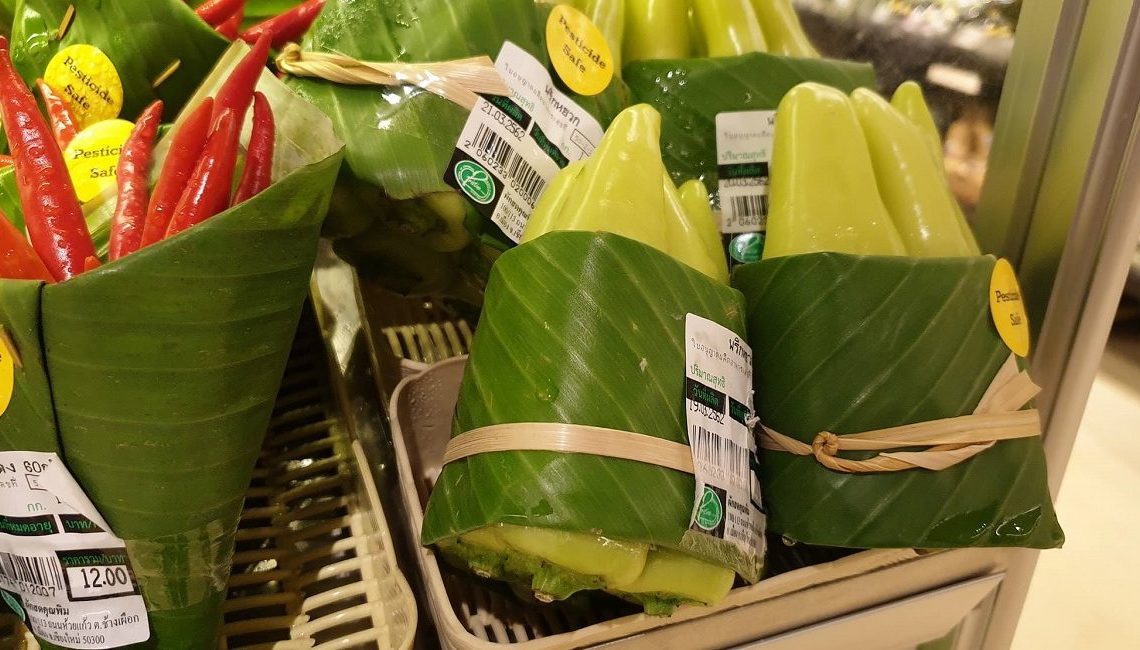
You might also like:
New Zealand has become complacent in its ‘100 % Pure’ image, last year falling seven places to 17th in the Environmental Performance Indicator rankings.
Despite Aotearoa’s national myth of pristine glaciers and fleecy white lambs’ wool, New Zealand has a lot to improve on when it comes to sustainability and care of the environment.
Perhaps it’s time we took a leaf from another country’s book on how to combat climate change and plastic pollution – a banana leaf, to be specific.
In Thailand some supermarkets have begun wrapping goods in banana leaves to cut down on single-use plastic bags.
A recent Facebook post went viral showing the Rimping supermarket in Chiang Mai wrapping produce in banana leaves.
“Way to go my Thailand!” wrote one Facebook user, reminiscing on packing school lunches in banana leaves. “Makes the food look so much more tempting,” wrote another.
Banana plants (actually a herb, not a tree) are very fast growing, reaching maturity in just 9 months and producing its one and only bunch of bananas. At this stage in the plant’s life there is nothing farmers can do but cut the plant down to allow its baby “suckers” to grow in its place.
At between 1-3 metres, banana leaves are huge and, unlike plastic bags, completely biodegradable.
Is there anything better than travel for discovering and adopting new ideas?
Vice Magazine also reported on this natural alternative which was being trailed at supermarkets in Thailand and Vietnam.
The Lotte Mart chain – which owns supermarkets in Ho Chi Minh, Saigon and Hanoi – has taken up the idea and begun wrapping its produce in leaves.
Talking to the paper VNExpress, a store spokesperson said although the leaves are in a trial phase they hope to roll out the ‘green’ new packaging across the country.
“When I see vegetables wrapped in these beautiful banana leaves I’m more willing to buy in larger quantities. I think this initiative will help locals be more aware of protecting the environment,” said a customer in Vietnam.
By swapping plastic wraps for leaves, it’s hoped the move will reduce the amount of plastic ending up in the oceans of south east Asia.
In March the UN declared a “plastic waste crisis” after the environmental assembly in Kenya.
Just to illustrate the scale of the problem: last month a whale washed up in the Philippines with 40 kg of plastic waste in its stomach.
The volume of plastic pollution from humankind is literally choking our oceans.
In South Korea, where plastic bags were outlawed this year, shops have begun wrapping goods in cloth and paper. China’s 2008 bag ban is thought to have reduced Asia’s output by 40 billion plastic bags.
Meanwhile in Europe, the Dutch supermarket Ekoplaza has introduced a “plastic free” aisle for groceries and Berlin the container-less Kreutzberg supermarket Unverpackt has opened its second store.
However, there are few countries with so “green” a solution as the banana leaves of Thailand and Vietnam.
Source: nzherald.co.nz



